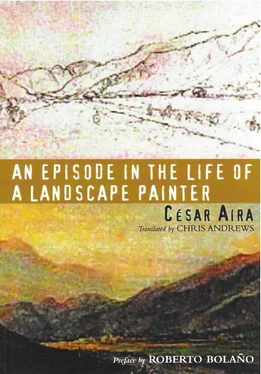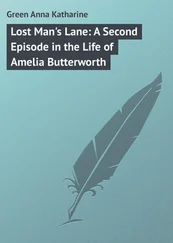Cesar Aira - An Episode in the Life of a Landscape Painter
Здесь есть возможность читать онлайн «Cesar Aira - An Episode in the Life of a Landscape Painter» весь текст электронной книги совершенно бесплатно (целиком полную версию без сокращений). В некоторых случаях можно слушать аудио, скачать через торрент в формате fb2 и присутствует краткое содержание. Год выпуска: 2006, Издательство: New Directions, Жанр: Современная проза, на английском языке. Описание произведения, (предисловие) а так же отзывы посетителей доступны на портале библиотеки ЛибКат.
- Название:An Episode in the Life of a Landscape Painter
- Автор:
- Издательство:New Directions
- Жанр:
- Год:2006
- ISBN:нет данных
- Рейтинг книги:5 / 5. Голосов: 1
-
Избранное:Добавить в избранное
- Отзывы:
-
Ваша оценка:
- 100
- 1
- 2
- 3
- 4
- 5
An Episode in the Life of a Landscape Painter: краткое содержание, описание и аннотация
Предлагаем к чтению аннотацию, описание, краткое содержание или предисловие (зависит от того, что написал сам автор книги «An Episode in the Life of a Landscape Painter»). Если вы не нашли необходимую информацию о книге — напишите в комментариях, мы постараемся отыскать её.
An Episode in the Life of a Landscape Painter
An Episode in the Life of a Landscape Painter — читать онлайн бесплатно полную книгу (весь текст) целиком
Ниже представлен текст книги, разбитый по страницам. Система сохранения места последней прочитанной страницы, позволяет с удобством читать онлайн бесплатно книгу «An Episode in the Life of a Landscape Painter», без необходимости каждый раз заново искать на чём Вы остановились. Поставьте закладку, и сможете в любой момент перейти на страницу, на которой закончили чтение.
Интервал:
Закладка:
Rugendas was waiting for him in the yard with his little box of charcoal sticks and his hat pulled down over his face. He kept talking about a mantilla, and Krause finally understood what he meant. It was a good idea; he should have thought of it himself, but he could hardly be blamed, what with everything else he had to think of. I'll go and see, he said, and tell our hostess what we are planning to do. Rugendas went with him, and when they found the lady of the house, in the kitchen, it was the invalid who summoned all his ebbing strength to make the unusual request for a lace mantilla, of the kind worn at mass, black, naturally, it went without saying. South American ladies were well supplied with such Catholic accessories. He did not explain in detail why he needed it, and she must have supposed it was to hide the hideous disfigurement of his face and his ghastly nervous tics. In which case, she can only have been surprised that he had taken so long to equip himself with that charitable disguise. For inhabitants of Mendoza (as for Chileans), the idea of a man wearing a mantilla was not so strange, because there was a long and venerable tradition of "masked men" in the region. In any case, it was a situation in which people kept making peremptory demands for the most incongruous objects without a word of explanation. She sent someone to fetch the mantilla, and while they were waiting, gave them some indication of where the fighting was taking place and how the sides were maneuvering. The idea of going out to paint the action struck her as splendid; she was sure they would capture some interesting images. But they had to remember to take precautions, and not get too close. Were they armed? Both had revolvers. No, there was no need to worry about her; the house was safe. It was not the first time she had been through this exercise and it no longer scared her. They even exchanged jokes; the hardy pioneers made light of the absurdity of the age. Their scale of values accommodated the most outrageous nuisances. For them, the Indians were simply part of reality. So the foreigner wanted to paint them? They could see nothing strange in that.
The mantilla arrived; it was made of fine black lace. Rugendas took it reverently, and the first thing he did was to gauge its transparence, which was, it seemed, to his satisfaction. He took his leave without further ado, promising to return the mantilla intact that evening. By then, said the lady with a heroic laugh, I may be Madame Pehuenche. God forbid! exclaimed Krause, bowing to kiss her outstretched hand.
So they set off. A farmhand held the yard gate open; it would be barred behind them. Rugendas was waving the mantilla like a madman, and he bumped into one of the pillars of the gallery. Up they leapt onto their horses. But Rugendas landed facing backwards, looking at the tail. The animals took off; he covered his face with the mantilla, put his hat on top of it, and knotted it around his neck… But when he came to look for the reins of course he could not find them. The horse was headless! That was when he realized he was sitting backwards, and turning around was a nightmare circus trick. By the time he had pulled it off (Krause, embarrassed, had gone ahead), they were already out of the yard, and the enormous grilles shut behind them with a clang to which the birds replied.
The beautiful San Rafael morning greeted them with songs of freedom. The sun was rising behind the trees. They rode side by side. Rested and docile, Flash and Dash stepped evenly, their faces inexpressive. Is everything all right? asked Krause. Yes! Are you all right? Yes! And it was true: he looked absolutely fine, with the mantilla covering his face. It hid the damage. Although, of course, that was not why he had chosen to wear it. He had wanted something to filter the light. Direct sunlight tormented his poor addled head and his shattered nervous system. His pinpoint pupils could not contract any further; the drug had deactivated the adaptive reflex and even moderate illumination soon became too much for him. It was as if he had taken another step into the world of his paintings. By virtue of a curious phenomenon of conditioning, Krause kept guessing at the absurd grimaces hidden by the black lace.
The morning was truly glorious, perfect for a raid. There was not a cloud in the sky; the air had a lyrical resonance; birds were combing the trees. The lid had been taken off the world specifically to reveal the conflict, the clash of civilizations, as at the dawn of history. They came to a vast prairie, heard shots in the distance and set off at a gallop.
Krause did not write letters, or if he did, no one bothered to keep them. So his thoughts can only be reconstructed in an indirect or speculative manner. Rugendas remarked repeatedly that he seemed to be preoccupied (describing his own state in the letters, he tended to use Krause as a rhetorical device, a supplementary "color": the feelings attributed to his friend, or, in some instances, invented for him, served to express what tact or shame prevented Rugendas from saying about himself, for example, "K. thinks that the quality of my sketches has not declined"). While continuing to fulfill his self-imposed duties, if anything with greater vigilance, Krause withdrew into a melancholy abstraction. As they rode out that day he was assailed by gloomy thoughts about the state of his friends health. He felt guilty about going along with his mad plan, and not just because it was mad: agreeing to it was like saying "What the hell," like granting a dying man his last wish. All his reactions were colored by the idea that death had come between them and struck a blow, whether fatal or a mere foretaste was immaterial for the moment. In the course of a journey one encounters so many people, such a mass of humanity, that to be singled out seemed unjust. Yet since it was so natural not to ask of another "Why him?" the question "Why me?" seemed scandalous and impossible. Of course in Krause's case it was not "Why me?" but "Why him?" Nevertheless the close bond between the two men gave the question a new twist, producing its most disturbing form: "Why not me?" This made Krause think of himself as a survivor, an inheritor, a vessel for his friend's whole life, dragged along by an immense force of time. If, as he had often felt, simplifying intuitively, he and Rugendas made up all of humanity, each of them was equally likely to be struck down. And whichever it was, the balance would be maintained. After all, this splendid raiding day might be remembered as "the day Krause died." That was why they stayed together, in spite of everything that could have driven them apart. Having a partner was a way of outliving oneself, in life and in death. And although, regrettably, this led to feelings of guilt and nostalgia, the resulting melancholy had a role to play in the general system of euphoria: only melancholy generated good ideas about the dead, and those ideas could contribute to the procedure.
Indian fever was catching. Where where they? Rugendas and Krause rode off into the radiant dawn in search of them, as in an illustration. By chance they came across a path, which must have led to the post office, so they followed it at a dash, hearing shots closer and closer at hand, then shouts. It was the first time they had heard Indians.
They passed through a series of parallel windbreaks and the action came into view, the first action of that memorable day. In the distance, the white post office, tiny like a die. Closer, a party of ranchers on horseback, shooting into the air, and the Indians, on horseback too, galloping around and shouting. Everything was moving very quickly, including them, as they rushed down into the little valley at full tilt. The engagement, like all the others they were to witness, operated as follows: the savages were equipped only with cutting and stabbing weapons, pikes, lances and knives; the white men had shotguns, but they used them to fire warning shots into the air, thus keeping the enemy far enough away to render their weapons ineffective. And so they skirmished back and forth. This balance could only be maintained at high velocity: both sides kept accelerating, and as the other side had to keep up, they reached their physical limits almost immediately. The scene was very fluid, very distant, a mere optical play of appearances…
Читать дальшеИнтервал:
Закладка:
Похожие книги на «An Episode in the Life of a Landscape Painter»
Представляем Вашему вниманию похожие книги на «An Episode in the Life of a Landscape Painter» списком для выбора. Мы отобрали схожую по названию и смыслу литературу в надежде предоставить читателям больше вариантов отыскать новые, интересные, ещё непрочитанные произведения.
Обсуждение, отзывы о книге «An Episode in the Life of a Landscape Painter» и просто собственные мнения читателей. Оставьте ваши комментарии, напишите, что Вы думаете о произведении, его смысле или главных героях. Укажите что конкретно понравилось, а что нет, и почему Вы так считаете.












